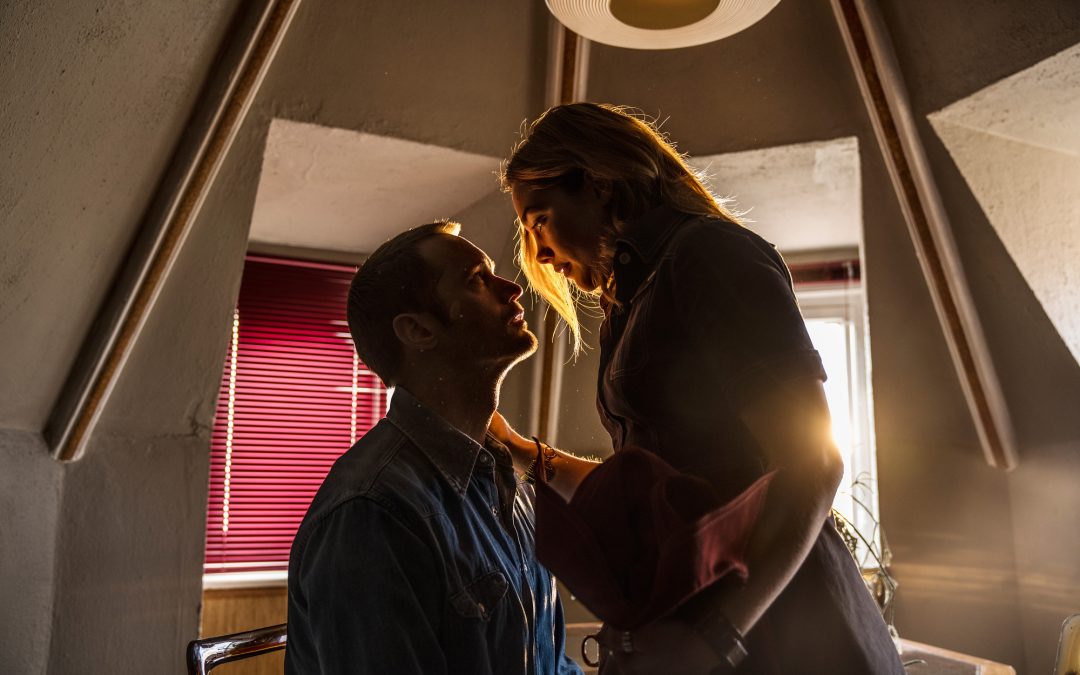This review contains spoilers.
“Do something,” Marty told Gadi halfway through episode four. Fearing the loss of his leading lady—who, fresh from being held at gunpoint and learning that she’d been complicit in a double murder, was feeling justifiably surly—, Marty saw his beautiful plan slipping out of grasp. He told Gadi to act, and Gadi did.
Or did he?
Was his night with Charlie just an act? Simply more grooming to push her where the plan needs her to go, or was it real? That’s the ongoing question on which this story balances: where fiction ends and reality begins.
While we’ve been watching Gadi instruct Charlie in her love affair with Michel, it’s up to us to decide if we’ve also been watching Gadi fall for her. Over the surveillance radio, she reads him Michel’s choice of poet in Palestinian Mahmoud Darwish, but her choice of poem, about dreams and identity. (Was it also selected for its mention of swans, as a nod to their meeting by the lake in Somerset? Charlie’s right about crisps and Englishness, by the way. The two will ever be indivisible.) Gadi certainly worries about Charlie being in danger, but whether that’s love or guilt we can’t be sure.
There’s plenty for Gadi to feel guilty about. When Marty said that it didn’t matter whether Charlie were to return from Lebanon “one of us or one of them,” he seemed to be admitting the as-yet-unacknowledged truth that Charlie isn’t their “best girl”, she’s their human sacrifice. Estranged from her family, pulling away from her friends and drifting through life… Charlie was carefully chosen so that she wouldn’t be missed. Whether Gadi will allow the plan to reach its natural conclusion or not depends on what the seduction meant to him.
The scene at Gadi’s flat would be better described as capitulation than seduction. Charlie’s been trying to get her mysterious stranger into bed for weeks and finally, he assented. This time, there were no manifestations of their colleagues standing like a ghostly coven around their bed, just two lovers learning about, and delighting in each other, Pomeranian bites and all.
The dual courtships—one fictional, one possibly real—give The Little Drummer Girl head-scratching complexity. This is a spy thriller with more on its mind than tense rendezvous and car chases. It’s playful, and experimental, and, like Charlie, takes itself just the right amount of seriously.
Charlie’s situation became a great deal more serious in episode four. After paddling around with nothing to do following her Austrian border coup, this week she was fast-tracked into real danger. Her entry to Khalil’s cell rested all on her performance, and as pal Sophie told her, she’s never acted better in her life than now. It’s an acting game, this spy business. Even Salim’s sister Fatmeh played the role of the non-English-speaking servant while she sussed out the new recruit before making her dramatic reveal.
There was real tension in that scene, and in Helga and Anton’s interrogation scene. Comedy too. Needing fifty pence for the electricity metre mid-death threat was a welcome release valve for the high-pressure intensity. Like Charlie’s crisps-chat, The Little Drummer Girl’s script is full of those.
It’s also full of beauty and visual surprise. The scene by the lake, in Gadi’s apartment, in the Lebanese villa… it’s all designed and lit with such flair. The sex scene too, with its surreal eye-mouth-flash, avoided all cliché.
A girl like Charlie may come along once in a lifetime. You might say the same for a TV drama as exquisite looking as this one.
Read Louisa’s review of the previous episode here.

